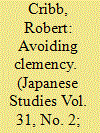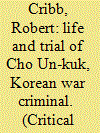|
|
|
Sort Order |
|
|
|
Items / Page
|
|
|
|
|
|
|
| Srl | Item |
| 1 |
ID:
106797


|
|
|
|
|
| Publication |
2011.
|
| Summary/Abstract |
Like other Allied powers in Asia, the Netherlands Indies government embarked on the trial of Japanese military personnel accused of war crimes during the occupation of the Indonesian archipelago. Although calls for clemency towards convicted war criminals were heard as early as 1947, the Dutch authorities resisted the suggestion that prisoners be released or repatriated. Many Dutch residents of the former colony remained bitter about Japanese crimes during the occupation. They also blamed Japanese policies for the insurgent Republic of Indonesia, which at times after its independence declaration in August 1945 controlled large parts of the archipelago. Whereas the rise of communist insurgency in other parts of Southeast Asia, and the broader context of the Cold War, rapidly diminished in those regions the importance of keeping war criminals imprisoned, the Dutch saw their war against the Republic as a continuation of the war against Japan and saw the continued detention of war criminals as essential. When military, diplomatic and political weakness forced the Dutch to recognize Indonesian independence in December 1949, one of their last acts was to arrange the transfer of the remaining imprisoned war criminals to Sugamo Prison in Japan.
|
|
|
|
|
|
|
|
|
|
|
|
|
|
|
|
| 2 |
ID:
160926


|
|
|
|
|
| Summary/Abstract |
In 1946, a British military court in Singapore tried a Korean national named Cho Un-kuk for war crimes against Allied prisoners of war on the Thailand–Burma Railway during the Second World War. The evidence against Cho was scanty, but he had been part of a group of Korean guards notorious for brutality towards prisoners. In expedited proceedings relying heavily on affidavit material, Cho was found guilty and sentenced to fifteen years in prison. The trial revealed both Cho’s unexpected transnational background as a dentist in pre-war British India and the complex position of Korean guards on the Railway. Often characterized as universally brutal as a result of their own ill-treatment by the Japanese colonial system, the guards responded in many different ways to the pressures and opportunities of service subordinate to the Japanese military. After sentencing, Cho served time in Singapore and Japan. He left prison a broken man in 1955. Like other Koreans who had been in Japanese military employment, he was spurned by other Koreans as a collaborator. Only in 2006, after his death, was he officially recognized as an unwilling conscript into Japanese service. His case illustrates the difficulty of distinguishing victims and perpetrators in the tangled circumstances of the Second World War.
|
|
|
|
|
|
|
|
|
|
|
|
|
|
|
|
| 3 |
ID:
005718


|
|
|
|
|
| Publication |
London, Longman, 1995.
|
| Description |
xv, 192p.hbk
|
| Series |
Postwar World
|
| Standard Number |
0582057124
|
|
|
|
|
|
|
|
|
|
|
|
Copies: C:1/I:0,R:0,Q:0
Circulation
| Accession# | Call# | Current Location | Status | Policy | Location |
| 037094 | 959.803/CRI 037094 | Main | On Shelf | General | |
|
|
|
|
|
|
|
|
|